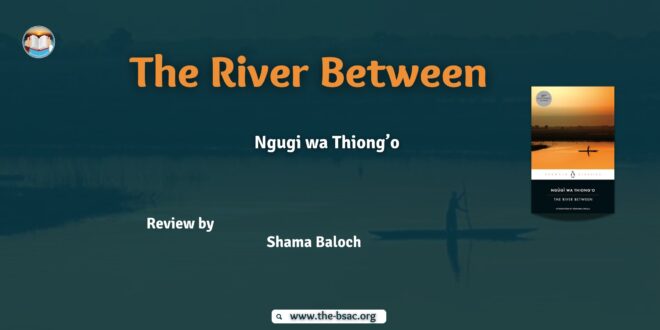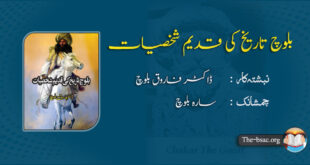The River Between
Ngugi wa Thiong’o
Reviewed by: Shama Baloch
The River Between is an African novel, written by Ngugi wa Thiong’o which tells the story of two neighboring villages of Kenya where native people are separated and colonized by faith, culture and language in the early 20th century. The river between describes how the white settlers’ introduction of their own religion to Sariana tainted the Gikuyu’s customs and culture, revealing that they were a sin that the natives had foreseen long ago. One of the Mugo who was raised in Kameni from birth. He informed the populace because he observed several butterflies of various hues fluttering across the landscape, upsetting the tranquility and orderliness of the nation, but the locals chose to ignore him. Ngugi then presents a boy as humanity’s savior. Prophecy is part of the Waiyaki’s ancient bloodline. Chiege, Wiaykakia’s father, also told the locals about the white guy, but they refused to listen. Chiege, however, instructed his son Wiakayi to follow the prophecy: “Go to the mission place and learn all the secrets and wisdom of white man, but don’t follow his vices, be true to your people and the ancient rites.” Mugo used to say that you couldn’t cut butterflies with Pagna; you wouldn’t spear them until you understood and knew their movements and ways. You could then try to fight and trap him. Wikiyu sent him to gain white man’s education.
Now here comes Joshua, a white man’s follower who has abandoned his faith to preach white man’s religion along with his two daughters, Muthoni and Nyambura. Muthoni, who disobeyed his father by refusing to the Christian religion while adhering to her own ancient customs and culture, which include getting circumcised. The central rite in the Gikuyu way of life is circumcision, which is a tradition in which girls and boys are circumcised at an event when they are deemed pure and enter the age of manhood and womanhood. However, according to the teachings of Jesus, Joshua who has accepted the white man’s faith, missionaries dislike the practice of circumcising girls because it is a devil’s work, and “those who refuse him are the children of darkness.” However, Livingston was a man of moderation and advocating gradual methods of eradicating the customs. Joshua’s followers would cause so many divisions in the land and if the practices of gikuyu culture were abolished that the tribe would perish. The white people who had moved to Siriana and now owned the land they were going to pay taxes on were destroying their religion and customs.
Joshua stated that she had committed a curse and that it was her punishment has she died. Muthoni, who disregarded his father’s (White man) teachings and adhered to his own Gikuyu customs, was circumcised. As a result, she became ill, and Wiayaki took her to a missionaries’ hospital where missionaries poisoned her to death. Following his father’s warning and Muthoni’s passing, Wiayaki began to consider the circumstances surrounding white settlers who have seized people’s land and they are the masters. As the youth start talking about the circumstances Wiayaki quote:
“I shall take my father for example he is the head of my family suppose another man, Karanja or Njuguna for example comes in and we offer him hospitality. Suppose after a time deposes my father and make himself the head of family with a right to control our property. Do you think he has any moral right to it? Do you think i am bound to any consideration to obey him? And if condition become intolerable it lies with me to rebel, not only against him but against all that his harsh, unfair and unjust”,
For instance, in Siriana Mission, the man of God arrived in peace and was given a piece of land. See what has happened now. Their brothers have been asked to come and invade all of the land. This government post behind Mikuyu is a plague among us, and it is hut tax. Our nation has been invaded. The same face is currently worn by newcomers to Siriana.
Wiayaki became the youthful, unofficial leader of the education movement after seeing that the ridges needed knowledge and unity. However, the White man’s education was insufficient, so he started teaching there. Although his father had cautioned him against becoming influenced by white people’s habits, was he giving him an uncontaminated education? Did he personally uphold the oath he took on behalf of his people?
Tragically, he starts dating Joshua Nyambura’s uncircumcised daughter, who defies Gikuyu customs and lifestyle. Wiakayi’s situation has gotten worse because of this, and others who are envious of him would profit from it and propagate false information. Wiayaki has betrayed the tribe by attempting to marry an uncircumcised female who is not from our community, which caused commotion.
He then reasoned that there were numerous things that I was unaware of and had not witnessed the new knowledge that was sought to be expressed politically. For a marginalized group, education is not everything. When he considered political organization education for unity and unity for political freedom, he informed his people about the heroic triumphs of history. “Great victories were possible when the hills were united,” he remarked.
We must stand together, united, and strong to fight together in one political moment, or else we will perish trying to force the white man out. The white man arrived and split us, bringing jealousy amongst the ridges. We must fight together to drive white man out۔




